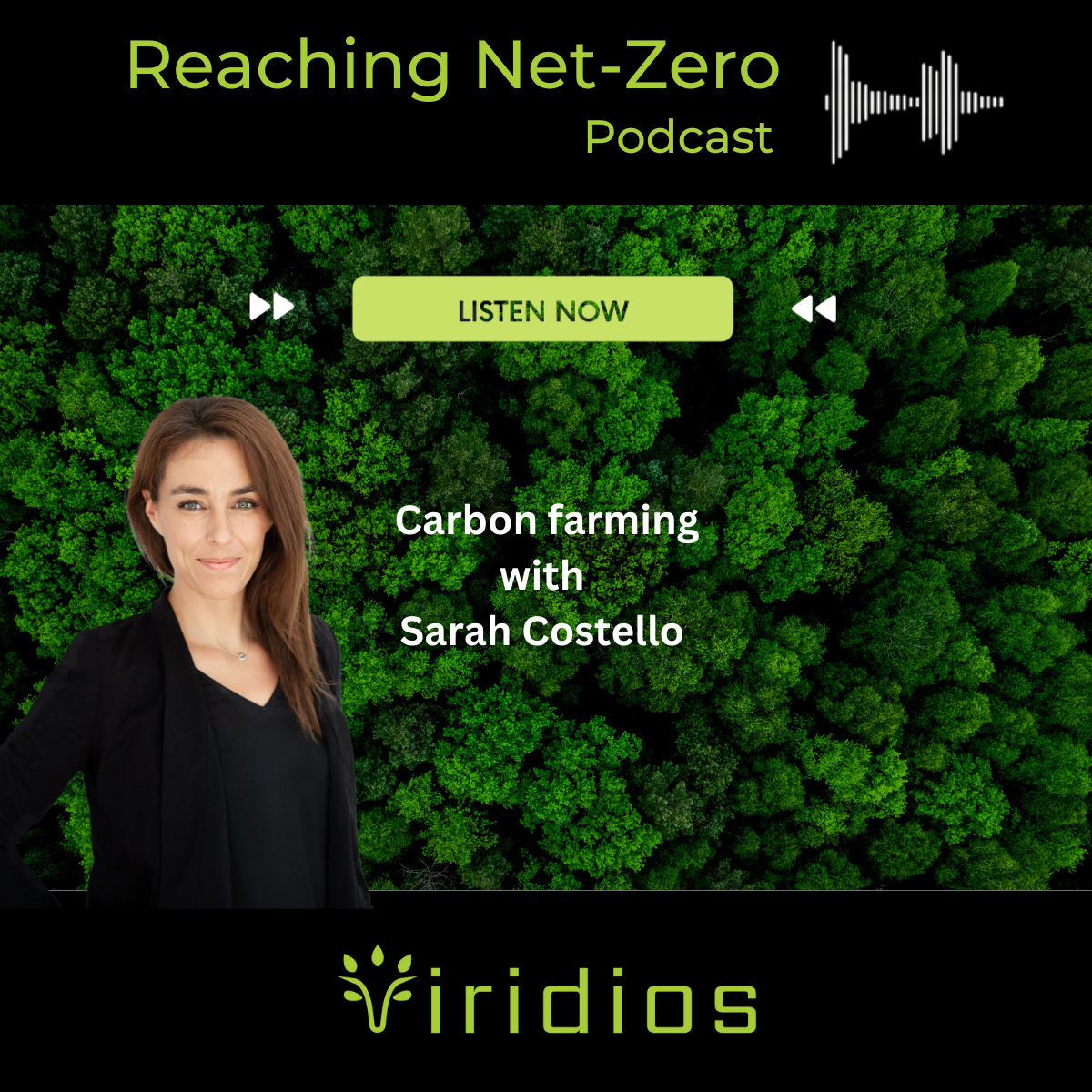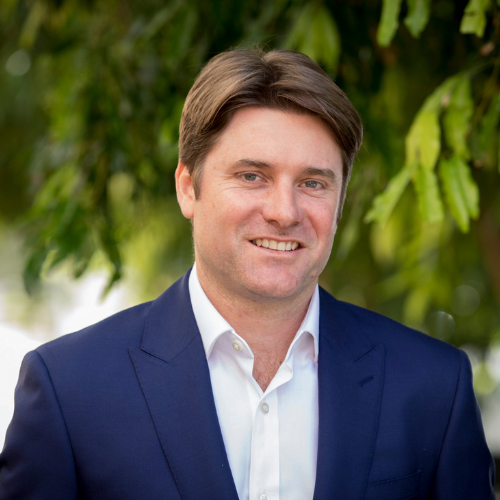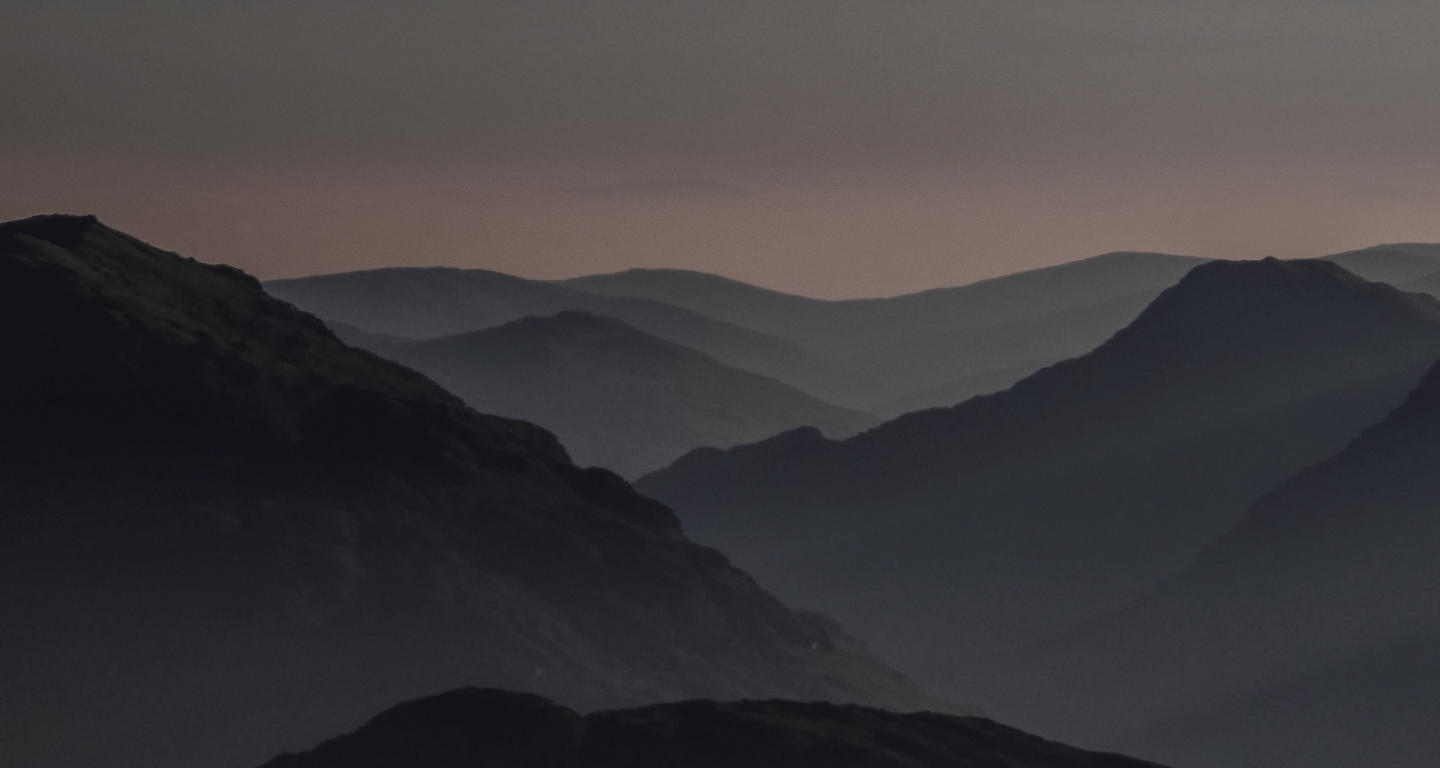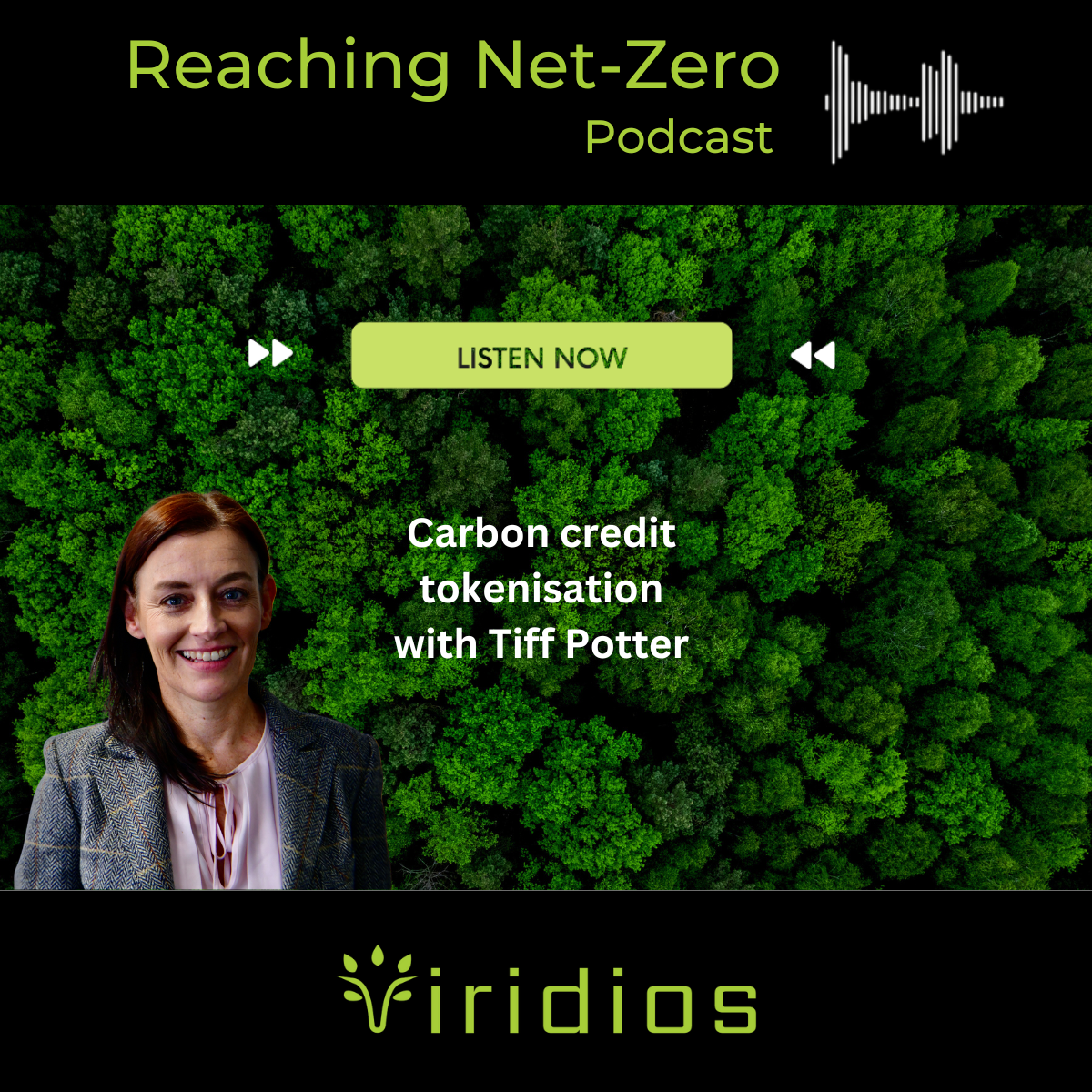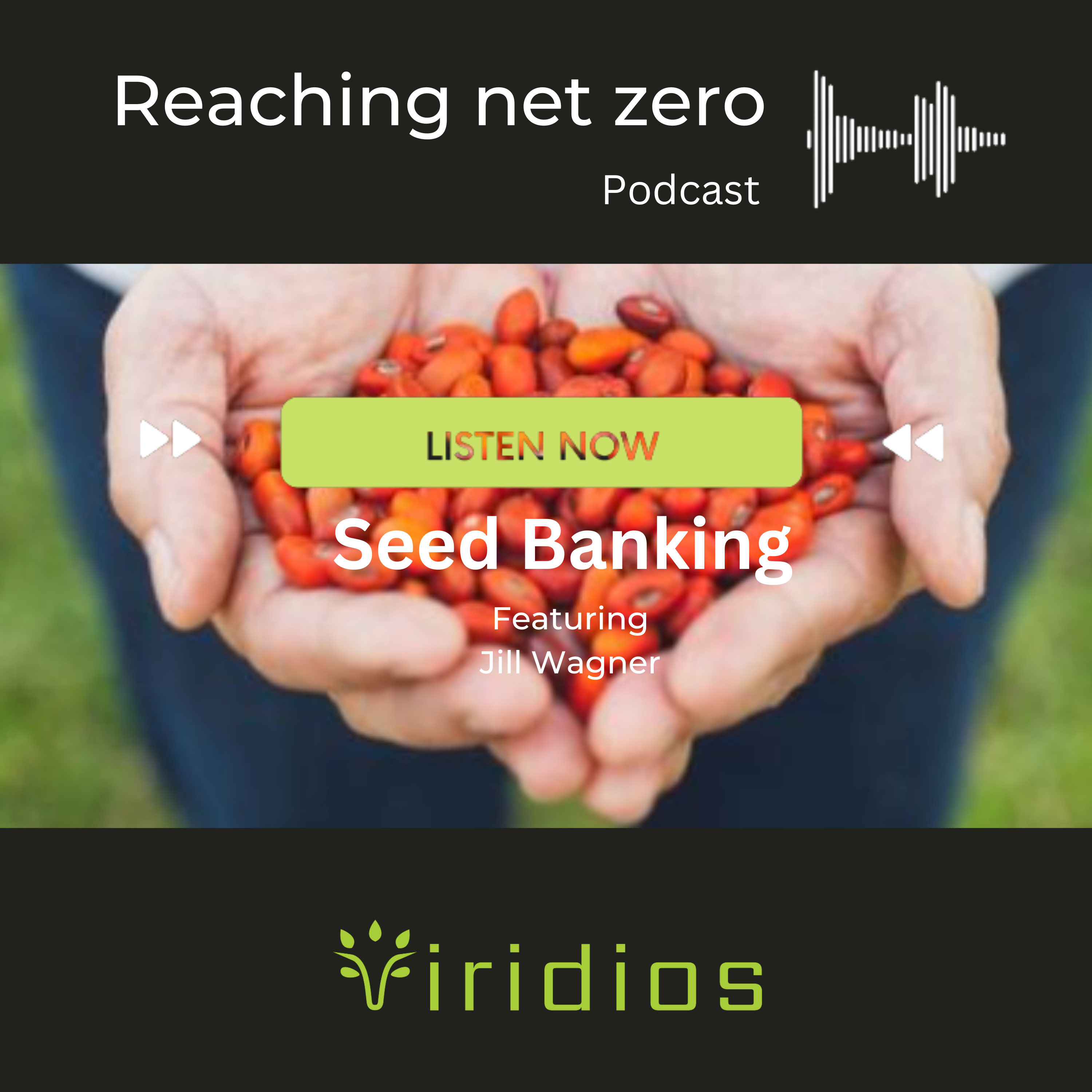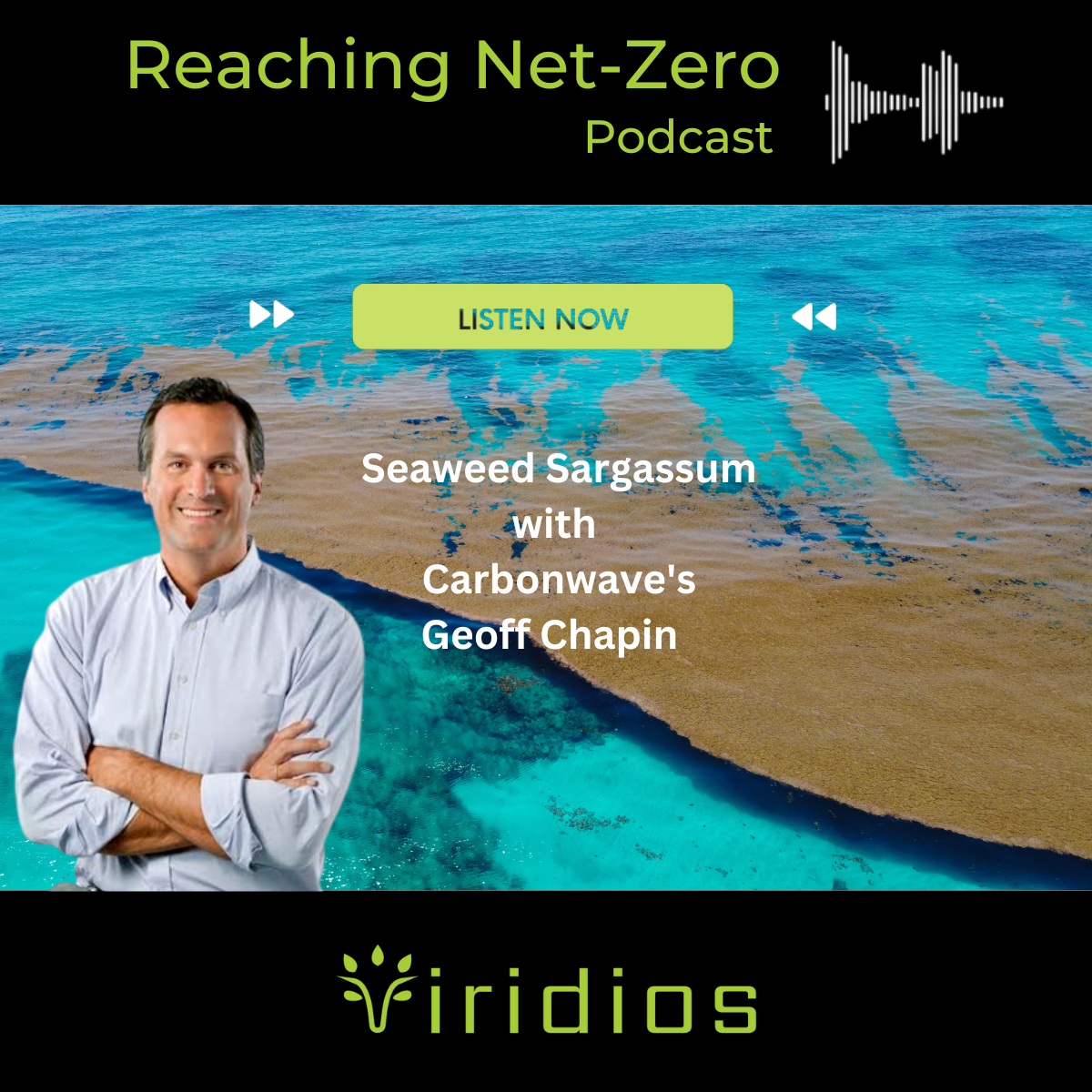Episode Transcript
Speaker 1 00:00:06 Welcome to the Viridios Capital's reaching net zero podcast. In this series, we look at the issues and opportunities, various industries face as they make their way to net zero emissions. By 2030. In this first episode, we look at the farming industry and talk to carbon management expert. Sarah Costello. Sarah is head of origination at Viridios Capital Australia and an expert in water waste, environmental remediation, carbon and ecological restoration. Sarah, welcome to Reaching net-zero.
Speaker 2 00:00:43 Thanks. Nice to be here.
Speaker 1 00:00:46 Great to have you with us. So, why don't we start by explaining exactly what net-zero means and why farmers will play such a key role in achieving it?
Speaker 2 00:00:58 Well, net-zero refers to what we call anthropogenic emissions or greenhouse gas emissions, which are generated by society. It, it is well documented that human activities, which include the burning of fossil fuels have contributed to a rapid increase in the concentration of greenhouse gases in the atmosphere. Mostly since the industrial revolution in the early 19 hundreds. And what we've seen is the rapid rise in CO2 concentrations is threatening the stability of our climate. So when we refer to net-zero, we refer to achieving a state of net zero carbon emissions, and this can be achieved by avoiding or reducing emissions as well as compensating for the remaining emissions by undertaking activities which remove or sequester carbon dioxide from the atmosphere. Climate change is now considered a global emergency as it directly threatens not only our lives as humans, but also the natural world and is also a direct threat to international peace and security. So this is why at the United Nations Climate Change Conference in 2015 Cop 21 countries have united to recognize at an international level, the importance of urgent and effective action to tackle climate change. This is what we refer to as the Paris Agreement and this agreement sets long term goals and guides nations to implement activities on a national level to substantially reduce global greenhouse gas emissions and limit global warming to two degrees. And if possible, prevent increases above 1.5 degrees.
Speaker 1 00:02:52 Obviously it impacts all of us and it impacts all of humanity. What motivated you to get into this space?
Speaker 2 00:02:59 I think I've always had a strong interest in social justice and equality. When I started my studies, I was really focusing on peacekeeping and peace and conflict studies, uh, and international relations. And what I saw through those studies is that the environmental changes that we were experiencing were heavily contributing to the large disparities that we're seeing in terms of financial equality, the lives and livelihoods of indigenous people all around the world, things from the water wars that we're starting to experience in the Middle East to deforestation in the Amazon, which directly impacts on the lives of indigenous people. So I got really passionate about these kinds of issues and that that's what drove me to focus on, on environmental management and yeah, and, and climate action.
Speaker 1 00:04:01 I understand obviously like me, you also have a, a young family, what sort of world do you think there will be for them? So if the world reaches its net zero targets and, and, and if it doesn't like, just to help us unpack the urgency a little bit here for future generation.
Speaker 2 00:04:19 Yeah. I mean, it is a worry, sometimes we hear ignorance, it place in a sense, it is because as soon as you, you get into studying environmental science, the science of climate change, the relationship between the environment and, and wars, all of this creates a lot of anxiety for me as a parent. So I think what I'm, what I'm trying to focus on is that there are still hopes for us to, to change what we think is coming. What we know is coming, uh, from the science that we have, which is more frequent, severe weather events, floods, fires, as well as hurricanes and cyclones, depending on where you are in the world, what are shortages and as well as the loss of biodiversity around the world, I think there's a lot of things coming as a result of climate change. And as a result of society, not taking into a can the impact of what we're doing every day on biodiversity, for example, what I'm trying to teach my children is that there's things they can do. And, and the more they learn about it, the more they can become advocates for nature and the environment. So keep learning and keep, keep doing your bit as a, at the human level, at the individual level and everything we do can bring a positive outcome.
Speaker 1 00:05:54 I think that's a lovely thing to seek to achieve and inspire the generations that are coming that are gonna obviously have to deal with this significant challenge. You know, one of the, the things that I find interesting, obviously, uh, we need to eat. So we, we need a secure environment and the farming industry is obviously critical to this. So, you know, from what you've said, there's a real sense of urgency, the need to act combat climate change. And obviously food is critical. We need stable food supply. So how do we marry those two things? How, how can farmers help? Obviously we need to meet the needs of the growing and hungry population, but so what can farmers do as part of this journey to net zero?
Speaker 2 00:06:38 Well, when we think about going, going back to net zero, and what we're trying to do here is we're, we're trying to first reduce emissions that are currently being produced through our activities. And then we also try to remove emissions or sequester emissions. So the first part is about transitioning to a cleaner, cleaner technologies, transitioning to renewables, for example, to try and re avoid those emissions that we're currently generating. And, and the second part is about trying to recapture emissions that are in the atmosphere to capture or remove emissions. There's two ways, you know, broad ways, we can go about it. The first one is the investment. There's a lot of investment going into carbon capture and storage technologies. And certainly technology has a big role to play now, decarbonization strategy, but those technologies are not quite there yet. We can't put all of our, all of our chips into that bucket.
Speaker 2 00:07:48 Uh, so we still need to invest and, and try and find ways to make work. And hopefully they will be financially available in the near, but while this is going, we also need to focus on the best technologies to remove emission from the atmosphere to go back to nature and trees, sequestration into trees and plants and, and soils. So when we look at this, you know, carbon sequestrations and the natural assets that we have, naturally, we turn our heads to farmers because in Australia, for example, we can see that agriculture covers right, about half of, of our country, right? About 400 million hectares of land in Australia are managed under agriculture. So just simply looking at this fact, we, we know that farmers have a huge role to play in our journey to net zero. That doesn't mean they're responsible for that. And that doesn't mean that they need to do it alone. We also need to, to help them and be there for them in that journey, but definitely looking at the farms, the farming sector, and agriculture as a big role to play in our journey to net-zero.
Speaker 1 00:09:07 So just picking up on something, you said that we can all help them. We all have a role to play. How can consumers help farmers in this journey to net-zero?
Speaker 2 00:09:19 I think there there's quite a few things, right? So as consumers, we really have the ultimate power in this world, right? We can choose where we put our money and we can choose where we wanna buy our foods from of course, buying an apple that's being produced in Europe and eating it in Australia, doesn't have the same type of carbon footprint than buying an apple, which has been produced 30 or 50 kilometers from where you live. We need to support our businesses, our local businesses and our local producers by purchasing local. That's a key thing we can do. And, you know, really trying to think about, even if my apple is a couple of cents less, if I buy it from somewhere else, what is the actual environmental cost of buying that apple a couple cents cheaper? And what is the social cost of buying that apple a few cents cheaper if I'm not giving my money to the local farmers. So purchasing local would be the, the preferred choice, the second option as well. The second thing consumers can do is to look at labels of quality. And I mean, we know it's hard and, and some of these labels don't necessarily represent all the truth, but looking at, you know, regenerate agriculture. So cattle that's being produced through being grain fed versus being, being pasture fed.
Speaker 1 00:10:54 But just from there, from what you're saying, there seems to be some very simple things that consumers can do, but also farmers can do as well. I was intrigued recently by research from Deacon's Blue Carbon Lab and the UTS Sustainable Farms Team that found that something as simple as fencing dams produced 56% less methane than unfenced dams. Uh, it also found that 32% less dissolved nitrogen was produced 39% less dissolved phosphorous, and 22% less dissolved oxygen. So something as simple as that can have such a big impact, but I mean, maybe you could unpack that a little bit for us. How, how does that actually work? Why does livestock exclusion fencing lead to lower emissions?
Speaker 2 00:11:45 Well, livestock, exclusion fences. Um, so the method, the methane emissions that are generated from dam on farms and water bodies on farms around farms, it's the result of the natural process of biological degradation of organic matter in the water. So unpacking this a little bit further is when, when we look at properties where livestock have access to waterways, we can also witness the impact, you know, visual impact of having cattle around those waterways trampling, and I guess opening up and being exposed to bear soils. So when cattle walks around all these dams, they're basically kill those grasses and bushes and rip the soil in a way that turns to the appearance of bear soils around, around the dams. When a dam is surrounded by vegetation, the vegetation around acts as a filter.
Speaker 2 00:12:54 So set when it rains, sediments and nutrient runoff is captured and slowed down by this vegetation. And as soon as we have bear ground and bear soils around the dams and it rains and suddenly all of these sediments, which carry in nutrients with them, flow into the dam and the more sediments and nutrients will reduce the dissolved in the long term, reduce the dissolved oxygen content in the water, you you'll see the appearance of algae and all this organic matter that comes into the dams is then generating methane from that natural decomposition of organic matter. You also have man deposits around the dams, which is further nutrient deposits, then flowing into the dam and decreasing water quality. So by simply fencing dams we are excluding from the immediate surroundings of the dam, we avoid water contamination by sediments, nutrients and we prevent that methane generation.
Speaker 1 00:14:11 It's so simple, and it makes a lot of sense. And I'm sure for people listening out there as well, these simple solutions obviously are going to prove very effective. What other things out there for farmers listening now that they might consider what other things that they could do, simple steps to help reduce their carbon emissions.
Speaker 2 00:14:31 There's a lot of ways farmers can reduce their own carbon emissions. And these will very, depending on the type of operations they have and the climate the property. So there, there's quite a lot of variation in what can be done from one operation to another. But my advice would be to first go through the process of understanding the emissions profile of that operation. So consultants can help with that, but this, what this means is looking at the usage. So what energy, how much is used and where around the farm chemical usage on farm chemicals can have quite a big carbon footprint, fire management transportation. So we would be looking at all the activities that are happening, what are we using to run our operation and to understand where those emissions come from. And once we do that, we can make more informed decisions and prioritizing particular areas that might be easier or less costly to address first.
Speaker 2 00:15:38 But as I was saying before, in addition to reducing their own emissions on farms, there's also a lot of opportunities for the land sector to, to take part into Australia's emissions reduction, target, which will improve the environment and also be financially rewarded for those efforts in Australia, we have what we call the emissions reduction fund, and the ERF offers farmers and, and landowners the opportunity to be remunerated for activities that are implemented on farms, which remove or avoid carbon emissions for every certified ton of CO2 equivalent, which is removed or avoided farmers are remunerated through the sale of carbon credits. This can include activities relating to vegetation and soil management, as well as pure efficiency and activities, which reduce methane emissions from cattle. So overall this type of activities aim at improving the sustainability of the farming operation and the farmers can be remunerated for those efforts.
Speaker 1 00:16:50 So great. I mean, it's basically about taking a holistic view of the farming operation, but a as I understand it, from what you're saying, there's also systems and processes in place to help ensure that the farmers aren't financially worse off for taking these steps, which makes a lot of sense in, in terms of navigating these potential solutions and also the various incentives that are available to farmers. Would you, would you recommend that they just go it alone or, or does it help to have someone there working with them to implement a net-zero strategy?
Speaker 2 00:17:26 So there are a few aspects and requirements in the world with carbon with running a project. And so the first part of a carbon project is the design. So what that means is choosing activities, which we're going to conduct on a property that will lead to emissions avoidance or removal. An experienced carbon specialists will look at polar farm operation and work with the farmer to understand the operation, the landscape, to establish what approved methodologies under the scheme would be suitable for that operation. And in some cases that it's gonna be more than one thing we can do on that same property to generate credits. It is a good idea to seek advice on that aspect because a carbon specialist will help fit the right methodology or the right combination of methodologies to maximize the carbon potential of that property. Then you have the project planning and registration part.
Speaker 2 00:18:32 And so this can involve of paperwork and it's not for everyone. So what the farmers need to consider is whether they want to do this, whether they're able to provide all the documentation monitoring and reporting requirements. So really through that project planning phase, understanding what exactly is gonna be required from me, apart from the actual implementation of activities on the ground, from a reporting monitoring and verification point of view, am I going to be able to put all this together myself to, for the regulator, or should I employ the specialist to help me package all this information in a way that's going to be suitable for the clean energy regulator, the clean energy regulator only issues credits to operations that have gone through the appropriate process of registration monitoring reporting. So understanding of these requirements is important in deciding whether to go or whether to employ the services of a carbon specialist.
Speaker 2 00:19:49 The final aspect of carbon project is engaging is what we call environmental markets is the sale of credits. So what a carbon specialist can do for landowners is to maximize the value of the credits, which are generated from their property. The first way we do this is by making sure we create and measure all the additional benefits that are created from the project. So we call these co-benefits and investors who purchase carbon credits to offset their emissions are more and more interested in the stories attached with the projects they're investing in. So they're interested in not just the carbon abatement potential of that project, but they're also interested in what are the benefits? What are the good things this project is contributing in terms of improving biodiversity, improving indigenous livelihoods, other community benefits, water, quality benefits. So all of these, which we call co-benefits are important to investors. A carbon specialist or carbon company will be able to help package those. COVID. If it's measured them, define them, identify them, and we'll be able to then not just create an issue credits and sell credits. We'll be able to sell a project. And that generates a lot more than just a carbon abatement. This is important. I think this is a key way that carbon companies can be of value here is by really harnessing and valuing the co benefits. Lastly, carbon specialists are able to seek initial funding to support a project.
Speaker 1 00:21:44 Just picking up on something you said there around co-benefits, in your experience after visiting a number of the people seeking to implement some of these strategies and the various communities around Australia and across the region. What are some of the community benefits that you've seen that have been delivered as part of these strategies?
Speaker 2 00:22:06 Yeah, so carbon projects in Northern parts of Australia, like a very good example is Savannah burning projects in Northern Australia, which really have contributed to improving the livelihoods of many indigenous communities and indigenous land managers in Australia. Our indigenous people have been doing Savannah burning for many, many, many generations for over 60,000 years. What we see is that carbon is the enabler of that activity. We're able to fund indigenous ranger groups and indigenous ranger programs by monetizing ACCUs from Savannah burning projects. By doing this, we enable Indigenous people to go back on country, manage the land. There's a lot of cultural financial benefits. You know, you're creating indigenous employment. You're in a way, enabling the revival of some cultural aspects that they were able to conduct before for various reasons. So it, it is very important on farms, you know, implementation of carbon farming projects can bring many benefits from water quality benefits can increase the financial sustainability of a farming operation by diversifying the income of the farmers, basically running a carbon project is another source of income. And in some places, this can be quite crucial for operations. So co-benefits can range from benefits to local communities, benefits to the environment, you know, improved by your diversity on funds. They can very significantly that all of them are, are extremely important.
Speaker 1 00:24:02 Just finally, obviously you you've been through so many great things that farmers can do, simple things that they can do to reduce their emissions. How confident are you that they will embrace the challenge of reaching net zero?
Speaker 2 00:24:16 I think farmers are very well up to embrace their challenges. Many farmers around the world are already filling the impacts of climate change on agricultural production. And we're seeing more erratic weather and unpredictable weather patterns and an increased frequency and intensity of several weather events, which can be catastrophic for farmers. So farmers have an
inherent interest in, in helping with climate change mitigation. So creating healthier and more resilient landscape is very important. It will help with the sustainability of farm in the long term and the sustainability of the operations. I think farmers are on board with that idea that said I was, as I was saying before, we cannot really put that burden on farmers and although 51% or so of agricultural land in Australia of the, the total land area in Australia is, is agricultural. And, uh, we cannot really leave that responsibility to farmers alone. And by harnessing the value of, of environmental markets, such as the carbon markets and biodiversity crediting schemes, as well as nutrient trading schemes, all of these environmental markets really can be an enabler to really assist farmers and, and fund them for their efforts, making a, a meaningful contribution to our journey to net.
Speaker 1 00:25:50 That sounds amazing. And tell me, Sarah, if is there like one final message that you'd have for, for farmers, but also the next generation are, are kids that are growing up. What would be the final message that you'd, you'd leave them
Speaker 2 00:26:04 Carbon farming is a really good opportunity to reconnect with our land and heal our environmental problems. So keep learning. This is very important for, for our children to, to keep learning, keep connecting, stay connected with the land and a message to farmers would be there's help is coming. And there's a lot and lot more, more and more opportunities for farmers to take part in environmental markets and which will be critical for the implementation of sustainability and, and sustainable projects on land, over the next decade or two seek advice where possible the last thing we want is to get in and get stuck with bad choices, I guess. So it's seek advice and
Speaker 1 00:27:04 That's great. Sarah, thank you so much for joining the Reaching net-zero podcast and for your wonderful insights, much appreciated.
Speaker 2 00:27:11 Thanks.
